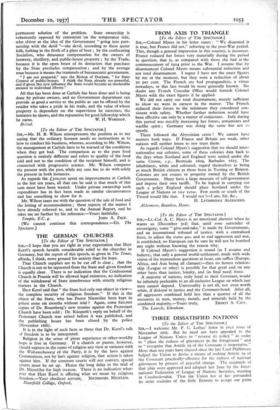FROM AXIS TO TRIANGLE
[To the Editor of THE SPECTATOR.] Sm,—Colonel Myers in his letter states : "We disarmed it is true, but France did not," referring to the post-War period. This, though a general impression in this country, is incorrect. France reduced her forces very materially during the period in question, that is, as compared with those she had at the commencement of 19I4 prior to the War. I assume that by disarmament Colonel Myers means substantial reduction and not total disarmament. I regret I have not the exact figures by me at the moment, but they were a reduction of about 50 per cent. The French are bad propagandists, a virtue nowadays, or this fact would be more generally known. No doubt any French Consular Office would furnish Colonel Myers with the exact figures if he applied.
We did not carry out total disarmament, merely sufficient to show we were in earnest in the matter. The French reduced their forces to the minimum they considered con- sistent with safety. Whether further reduction would have been effective can only be a matter of conjecture. Italy during this period was steadily increasing her forces, armaments and warlike spirit ; Germany was doing the same but not so openly.
There followed the Abyssinian crisis ! We cannot have matters both ways. If France and Britain are weak, other nations will neither listen to nor trust them.
As regards Colonel Myers's suggestion that we should inter- nationalise our colonies, some of these colonies date back to the days when Scotland and England were united under the same Crown, e.g., Bermuda 1609, Barbados 1625. The inhabitants, white and coloured, regard themselves as being as much British citizens as those born in Tooting or Brixton. Colonies are not estates or property owned by the British Government. Many have a large measure of self-government and impose their own tariffs. To be logical in carrying out such a policy England should place Scotland under the League of Nations or vice versa. Few north or south of the Tweed would like that. I would not !—I am, Sir, &c.,






















































 Previous page
Previous page